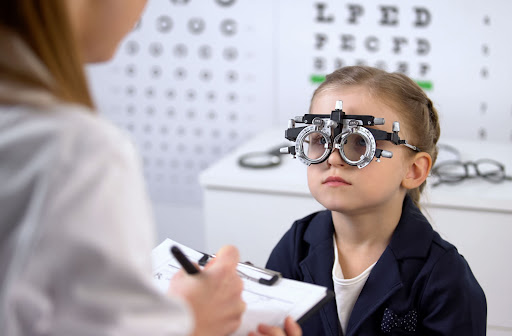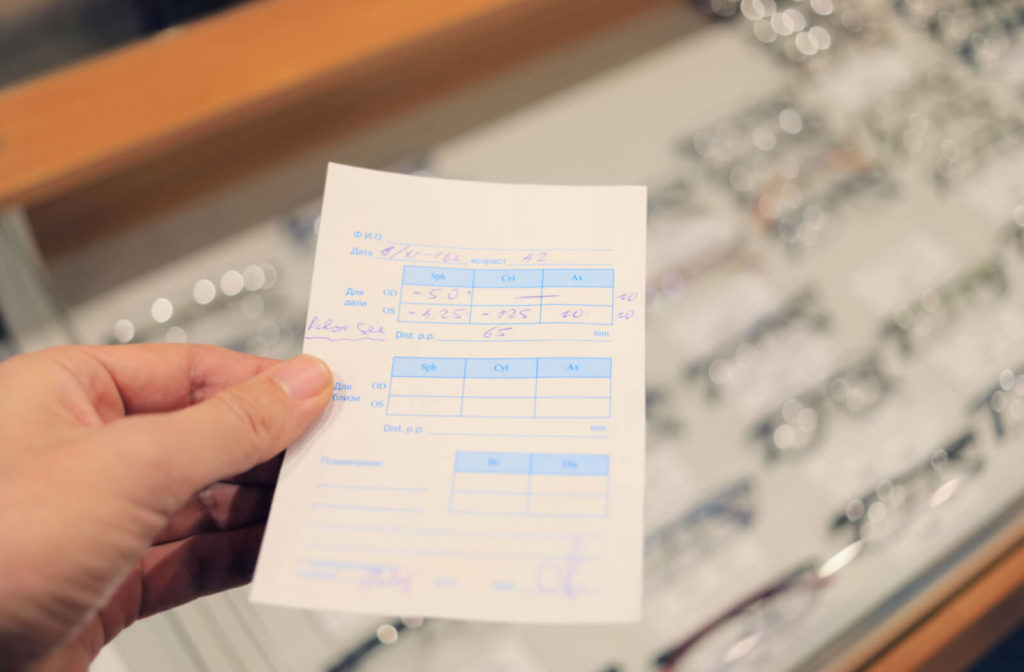If you need glasses at the end of your eye exam, your optometrist will write you a prescription. This prescription has the information needed to provide you with a pair of lenses that meet your vision needs.
When you get a glasses prescription, how long is it good for? When do you need to update it?
How Long is a Glasses Prescription Good For?
Your glasses prescription typically lasts 1 year, depending on your vision. You may have a shorter (one-year) prescription if your vision is at risk of worsening. Your eye doctor needs to update your prescription before you can buy new glasses.
Your vision may not have changed, but you have to book an eye exam to ensure this. During this exam, your eye doctor examines your eyes to identify possible changes to your sight.
Make Sure You Book Regular Eye Exams
Eye exams are needed to renew your glasses prescription, but they are also essential for protecting your eye health. Your eye doctor can examine your vision to identify any potential changes. The frequency of your eye exams depends on your eye health and vision.
According to the American Optometric Association, adults 18–64 without any eye problems need an eye exam at least every 2 years. Adults over 65 need an annual eye exam. Your eye doctor may want to see you more frequently depending on your eye health, so listen to their recommendation.
Why Do You Need a New Glasses Prescription?
Unfortunately, your glasses prescription is not immortal—it eventually needs to be updated. No matter your age, your eyes change with time.
When you’re a kid, your eyes constantly change as you grow, meaning you may need to update your prescription multiple times. Your eyes still change as an adult, just slower. After 40, many adults develop presbyopia, a common vision problem.
Presbyopia Can Affect Your Vision
Presbyopia is a condition many adults develop as they age, up to 30% of Americans. This condition affects your eyes’ ability to focus when looking at close-up images.
If you have presbyopia, you might experience several symptoms, including:
- Difficulty seeing close-up images
- Headaches
- Eye strain
- The need to hold reading material further away to see clearly
Your eye’s lens is normally flexible, bending easily to focus, depending on the distance of the object you’re looking at. As you get older, the lens hardens, becoming rigid. This makes it harder for your lens to change shape, leading to blurry vision when you read a book or focus on something close to you.
Presbyopia can seem concerning, but it’s actually a natural part of aging. You cannot prevent these changes, but you can update your prescription to get a pair of reading glasses or invest in progressives lenses.

When Might You Need a New Glasses Prescription?
Your optometrist can identify if you need a new prescription, but your eyes may give you some early warning signs. Your eyes should feel comfortable, and your vision should be clear when wearing your lenses. If your vision is not at its best wearing your glasses, you might need a new prescription.
There are several reasons you might need a new glasses prescription, such as:
- Headaches: The wrong glasses prescription can lead to headaches. You need to focus harder to see, straining your eyes.
- Blurred vision: A tell-tale sign of a refractive error is blurry vision. Trouble seeing while wearing glasses can mean you need a new prescription.
- Double vision: Double vision can mean your eyes don’t work well together or you have an eye problem. Frequent double vision means you should visit your eye doctor.
- Multiple years since your last eye exam: Going more than 2 years since your last eye exam means you need a new prescription. Your eye doctor can provide you with one after examining your eyes.
If it’s been a while since your last eye exam, make sure to check your glasses prescription before ordering a new pair. Your optometrist cannot provide you with a new pair of glasses without a valid prescription.
Is Your Glasses Prescription Almost Expired? Book Your Next Eye Exam
Your glasses play an important role in your daily vision. However, your prescription doesn’t last forever. Make sure you visit your optometrist for an eye exam to renew your prescription and identify potential changes or problems.
Contact Eye Care Plus when it’s time for your next eye exam.



